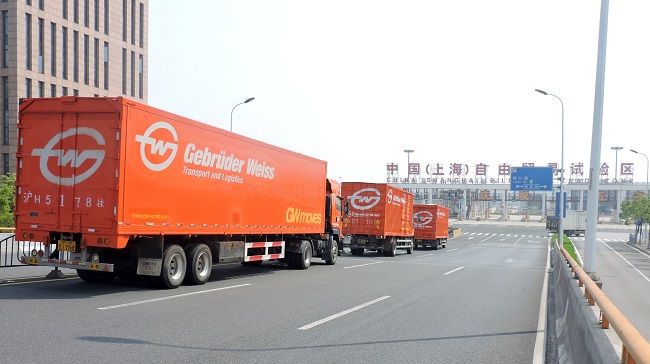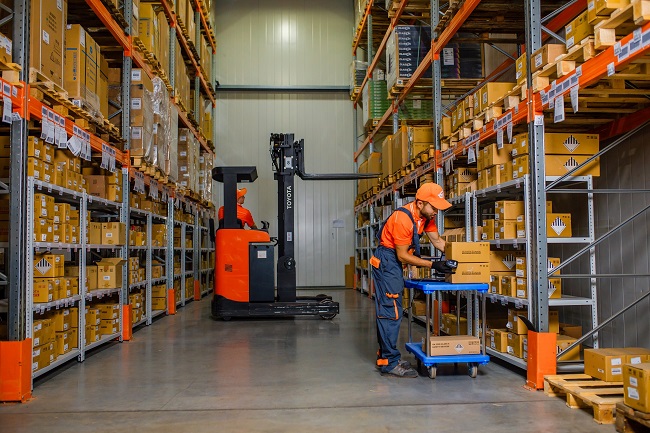Gebrüder Weiss: Great potential in Eurasian logistics market

In China, Gebrüder Weiss celebrates its 30th anniversary last year. [Photo/Gebrüder Weiss]
Over its long history the Gebrüder Weiss logistics company has often broken new ground, driving the company's successful growth. Currently, the full-service logistics provider sees huge market opportunities in Central Asia and the Caucasus region.
In the Gebrüder Weiss chronicles, the roots of this storied Austrian transport and logistics company date back more than 500 years, spanning the turning points and radical changes of Europe's turbulent history. The logistics expert has also made a point of forging its own path. Such as in 1992 when the company, already positive about China’s potential, opened their first office in Shanghai. This decision proved to be right on the money: the Chinese economy grew very strongly in the 1990s, in parallel with the Gebrüder Weiss branch network.
Some 31 years later, this first small office has grown into the headquarters of a countrywide organization. Gebrüder Weiss China can be found in 19 locations spanning the country’s major transport hubs. As a full-service provider, it organizes global transport and logistics solutions for prestigious customers from widely diverse industries.
It is this pioneering spirit that characterizes the corporate culture of Gebrüder Weiss and drives the company's growth. This feel for economic opportunities and the courage to seize them have made the Austrian family business a global player with 180 locations in 34 countries around the world. To provide customers with best-in-class supply chain solutions, the logistics provider is consistently advancing digitization, continuing to develop new markets, and expanding its transport routes and networks.
Growth market Central Asia
Central Asia is one of the regions in which Gebrüder Weiss intends to grow further in the future, as the company sees high economic potential there. Some recent figures: the total trade volume of Central Asia with the EU has increased some 40 percent between 2012 and 2022: from 34.2 billion euros(about $36.4 billion) to 47.5 billion euros. The company has been present in Kazakhstan for a few years now and continues to expand the Almaty location as a logistics hub complete with a dedicated siding track. Almaty links to the Gebrüder Weiss European general cargo network through the Tbilisi Caucasus hub, ensuring a direct connection between the Central Asian markets, as well as a connection to China. In line with the growth of Kazakhstan's economy, Gebrüder Weiss has responded by greatly increasing the number of its domestic services.
"Kazakhstan is outgrowing its role as a mere transit country, value creation within the country is increasing, and there is also growing interest by foreign companies in gaining a foothold here,” says Dieter Buchinger, area manager of the Silk Road at Gebrüder Weiss. Buchinger adds that the interest of market participants in high-quality warehouse and logistics solutions has greatly increased. To meet trade and industry demand, Gebrüder Weiss is investing in new storage space and in the development of its supply chain solutions segment. Service Excellence is the motto here. Customer needs are taken care of individually, by developing customized concepts. Local experts ensure this all works smoothly; they know the score not only in terms of customs matters and infrastructural characteristics, but also cultural particularities. One of the companies to benefit from this is car manufacturer Toyota; Gebrüder Weiss has assumed comprehensive warehouse logistics and distribution tasks for the company in Kazakhstan. Other international customers are from the high-tech, building, chemical and construction products, engine oils or consumer goods sectors. They make use of the great variety of services: land transport (including multimodal), air and sea freight services, customs clearance, warehouse logistics, and supply chain management.
In neighboring Uzbekistan, Gebrüder Weiss primarily serves customers from the agricultural sector. The office in Tashkent (opened in 2019) cooperates closely with the Almaty branch. It remains the company's immediate goal to further expand its presence in the Uzbek market and the range of rail transport services on offer. "The COVID pandemic has somewhat thrown us back in Uzbekistan, and we have not been able to develop as we would have liked to. But that does not change the fact that we consider Uzbekistan as an important component of our networking strategy for East-West trade," Dieter Buchinger comments.

The warehouses in Kazakhstan are utilized to full capacity. Gebrüder Weiss invests in new spaces and continues to develop its supply chain solutions segment. [Photo/Gebrüder Weiss/Kudrat)
Successful in Georgia
Gebrüder Weiss has made much more progress in Georgia. The logistics terminal in Tbilisi, close to the international airport, is being expanded for the third time; it offers truck and rail transport, air and sea freight, bonded warehousing, customs clearance, warehouse logistics, and e-fulfillment. In the past close on eleven years, the location in the Caucasus region has developed dynamically, serving customers from the textile, household goods, high-tech and automotive industries. Tbilisi is not only a regional distribution center (for Georgia, Armenia and Azerbaijan), but also an important link in the Gebrüder Weiss network for the transport of goods between Europe and (Central) Asia. Only recently, the logistics provider has set up a regular groupage freight service between Almaty and Tbilisi, linking Kazakhstan (through Georgia) more closely to its own (Southeastern) European transport routes and offering customers an alternative to air freight.
Generally, as a result of the war in Ukraine, the Caucasus region and Central Asia are increasingly in focus as key elements in the development of alternative transport corridors between Europe and Asia. One option to avoid the Northern Corridor via Russia is the Transcaspian route (Middle Corridor): running through Kazakhstan, the Caspian Sea, Azerbaijan, Georgia, then on through Turkey (land route) or the Black Sea (sea route) to Bulgaria or Romania towards the EU. The drawback: many border crossings make the route more complex, and goods need to be reloaded more often, sometimes onto ships. Due to insufficient road, rail, and port infrastructure, this connection is not yet competitive, but numerous expansion projects along the route indicate that the Middle Corridor is getting some international tailwind.
Gebrüder Weiss is a part of this development – writing yet another exciting chapter in its company history.
Infobox: The history of Gebrüder Weiss
The roots of Gebrüder Weiss can be traced back more than 500 years, making the logistics group possibly the oldest transport company in the world. Their history begins in the late Middle Ages with a transalpine courier line to northern Italy (Milan). At that time, money, letters, and important commodities such as silk were transported by horseback along a perilous route. Even passengers were sometimes taken, the most prominent of whom was Johann Wolfgang von Goethe in 1788. The company has been run under the name “Gebrüder Weiss” since 1823 and is still a family-owned business today. With around 8,400 employees and 180 company-owned locations, as well as annual sales of three billion euros (2022), Gebrüder Weiss is a global full-service logistics provider and Silk Road pioneer. Its portfolio of services includes digital services and supply chain management. www.gw-world.com








